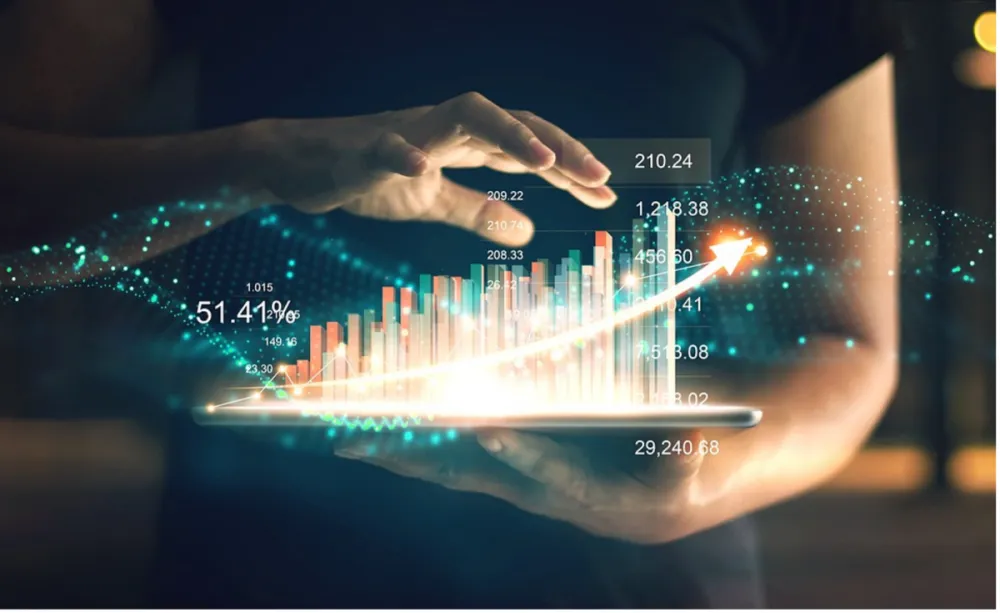When it comes to the IT industry, one thing is for sure – it keeps evolving quickly. The market requirements have been changing ever since computer science has spread into various fields, and due to new technologies emerging now and then, the industry has been facing critical gaps in demand and supply for various fields.
Two of the hottest fields in the tech world right now are cybersecurity and data analytics. Both have their crucial applications, and there is a significant difference between the two careers. Due to this, many of the freshers drown in confusion while selecting one field to pursue.
So today, we will be taking a detailed look at how cybersecurity and data analytics differ, and what are the most important things setting them far apart. If you’re planning to pursue one of them as your primary field or generally want to know, make sure you give this article a thorough read!
What is Data Analytics?
Data analytics, which is a sub-field of data science and in practice very similar to it, revolves around the concept of using any kind of data to enhance organizational decision-making skills. It’s the phenomenon of studying data to its depths, to find any kind of actionable insights, patterns, or pretty much anything that could help an organization make better decisions.
Data analytics works by providing you tools that help you study huge lots of business data in one way or another. These tools help to go through the data efficiently, often in the form of charts and visualizations. Since visualizations boost your efficiency while analyzing big data, it’s the most widely used form of data analytics these days.
What is Cyber Security?
Cyber security, as the name suggests, is a field that is primarily related to the security of data pools and organizational networks. By security, I’m strictly referring to denying information access to anybody who is not authorized, even if they’re a part of the organization.
Cyber security has been around since the evolution of computers. Because if you cannot protect confidential data from unwanted personnel, there’s no point in uploading important information to networks or computers in the first place.
Many companies are constantly on the lookout for sharp and creative minds who can make their way to a certain goal without anybody specifically teaching them to. These professionals are skilled at figuring out ways unauthorized users might attempt to access confidential data and then take steps to avoid compromising the information.
Data Analytics and Cyber Security – What’s the Difference?
A lot of freshers often come knocking on the doors of experts asking the major differences between data analytics and cyber security, since both fields are related to data one way or another. So, what sets them apart?
Data analytics centers around making good use of any form of data to help businesses make more informed decisions, while cyber security refers to keeping this and other confidential data safe from intruders or any unauthorized people.
Data Analytics Vs Cyber Security – Career Comparison
Let’s look at the career differences between the two fields so you can have an idea of how your career will differ when you pick either of these two:
Role
If you’re starting your career as a data analyst or a data scientist, your main task at hand will be to gather and analyze data from various sources. The data could be available in both structured and unstructured forms. From data ingestion to providing key insights to the business analysts or stakeholders, everything falls within your plate.
If you’re cyber security professional, your role will lie in protecting the information of your employer and keeping it safe from any kind of cyber-attacks, no matter what type they are. You’re allowed to use different techniques to keep a check over your network and deploy any required measures to keep the integrity of your company’s data.
Education Level
Getting a job in data analytics or data science at a reputed company requires a high level of education. While you might also be able to secure a starting position only after completing your bachelor’s, you will nonetheless be required to pursue a master’s degree to advance in your career. Since data science involves complex statistics and mathematics, having a sound understanding of the underlying concepts is a necessity.
On the other hand, getting a role of a cyber security professional doesn’t require having too much education. If you’ve done a bachelor’s in a related field such as IT or Security, you will be good to go and will pretty much be able to handle the workload. Nevertheless, you need to be skilled and creative to handle the job since it’s not as easy as it looks.
Highly Recommend next Article: How Long does it take to Learn Data Analytics?
Salary
Both the professions are quite decent and can land you a high-paying job depending upon your skills and experience. However, data analysts usually end up taking the lead when it comes to average salaries in the US.
The average starting salary in cyber security is on average $70k/year while for the data analysts, it’s around $80k/year. Senior data analysts can go up to $250k/year while senior cyber security analysts can also go as far as $200k/year. Source
So, there isn’t a significant difference when it comes to the pay-scale, and both offer roughly the same compensation. However, if you’re making the decision based on money, which I highly recommend you don’t, data analytics is the clear winner here.
Future Prospects
The use of the internet is growing sharper than ever. As more people use the internet, customer data available to companies is only expected to grow exponentially, thus higher need for experts in leveraging all that data. The U.S. Bureau of Labor Statistics estimates that data science field will grow about 28% through 2026. Hence, it’s quite evident that data analytics is yet to grow, A LOT!
However, on the other hand, cyber security is also something that never stays behind. As technology advances and hackers become more diligent, the demand for cyber security also rises. However, this rise isn’t specific to today’s era. As long as computers exist, cyber security will always be in demand.
So, to wrap things up, both have a very bright future but considering the boost of data in the current era, data analytics is seeing a much sharper rise and is expected to grow much faster than cyber security for at least the next 5-10 years.
Before we delve into the next points of discussion, skills comparison for each field, I’d like to recommend some of our top articles on data analytics, should you be interested in a career in the field, they should be quite interesting. Click and open them in a new tab so you can read them later.
-
The Role of Data Analytics at The Senior Management Level

From small and medium-sized businesses to Fortune 500 conglomerates, the success of a modern business is now increasingly tied to how the company implements its data infrastructure and data-based decision-making. According
-
The Decision-Making Model Explained (In Plain Terms)

Any form of the systematic decision-making process is better enhanced with data. But making sense of big data or even small data analysis when venturing into a decision-making process might
-
13 Reasons Why Data Is Important in Decision Making

Data is important in decision making process, and that is the new golden rule in the business world. Businesses are always trying to find the balance of cutting costs while
Data Analytics Vs Cyber Security – Skills Comparison
Photo by Sora Shimazaki from Pexels
The two fields are quite apart in the IT industry, and hence there’s a huge gap in the skill set involved. Let’s quickly go through the skills you will need to master if you need to get into either of them.
Data Analytics Skills List
Python/R
To analyze the data at hand, you need to have a weapon to use. Having strong command over languages with a statistically strong background, such as Python or R is crucial. While Python is more of an all-rounder, R is more inclined towards statistical calculations. The selection between the two depends upon the specific use-case you’re dealing with – but generally, data analysts are expected to have a solid grasp on both.
SQL
SQL (structured query language) is a programming language used to communicate with databases. Since data analytics is all about big data, being skilled in SQL to be proficient in dealing with data is a necessity in the career of data analytics.
Data Visualization
Data visualization helps to lay out huge chunks of data in a precise manner. Not only is it beneficial in spotting trends and patterns, but it also saves a lot of time for data analysts. And as a data analyst, learning and mastering the use of key data visualization tools is a must.
Presentation
No matter how good you are at studying data or finding patterns and driving insights from it – if you cannot effectively present your findings to the external teams, it will do no good to you nor your organization. So, showcasing your studies in a non-technical way to the external teams is amongst the biggest weapons in a data analyst’s arsenal.
Cyber Security Skills List
Computer Forensics
While computer forensics is a whole different field, it has a huge role to play when building the basics of cyber security. Irrespective of how good cyber security professionals are, there’s always a possibility that the hackers will outperform them. In such cases, forensics plays a pivotal role in helping them recover data and know what’s going on the ground level.
Hacking Fundamentals
Being able to get rid of anything first requires you to understand its dynamics. It’s crucial to anticipate hackers’ moves if you want to stop them. If you can think like them, you can take the appropriate steps to keep them away.
Problem-Solving
Cyber security is all about problem-solving. The best in the field have creative minds and can figure out ways how an organization’s data might be compromised. To find the minor loopholes in security systems, problem-solving is a necessary ingredient.
Technical Aptitude
Last but not least, technical aptitude is another thing one needs to practice if one wants to break into the field of cyber security. The problems hardly repeat, unlike data analytics; and professionals constantly need to think outside the box and come up with top-notch technical ideas.
Takeaway
Here’s a table that lists key skills for a data analytics career and for a cyber security career.
| Data Analytics | Cyber Security |
| Strong mathematical/statistical background | Strong hacking knowledge |
| Skilled in Python/R | In-depth understanding of Computer Forensics |
| Master’s Degree Preferred | Bachelor’s degree does fine |
| Analytical Skills | Problem-Solving Skills |
| Presentation Skills | High Technical Aptitude |
| High median salary | Low median salary |
| Often repetitive tasks | Highly creative tasks |
With the ever-increasing growth of internet-powered devices in the world giving a boom to IT, data analytics and cyber security are amongst its fastest-growing sub-fields. Both fields have significant differences between their working principles and the backgrounds required to get into them.
Throughout the article, we have spotted some stark differences between the two fields in all aspects, be it salary or skills. Make sure you go through the article in detail between choosing one over the other for your career.
